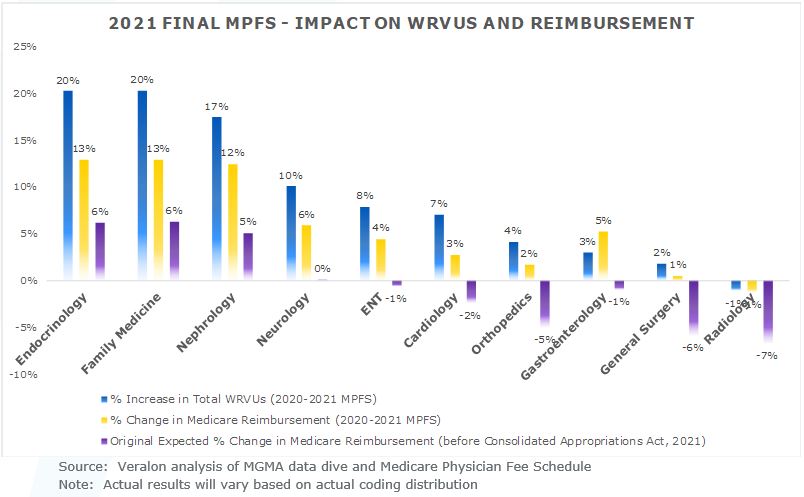Making Sense of the Ever-Changing Medicare Physician Fee Schedule
and Richard Chasinoff, Principal
and Jack Lacy, Senior Associate
Open PDF file >
By now you’ve probably read (whether published by Veralon or another source) that there were significant changes made to the 2021 Medicare physician fee schedule (PFS). The entire program was originally intended to be budget neutral, but reimbursement was restructured to increase payments to cognitive specialties (such as primary care and other medical specialties) and reduce reimbursement to procedure-based specialties.
However, the recent coronavirus relief package[1], published at the end of 2020, included a one-time, one-year increase to physician fee schedule (PFS) payments for 2021 thereby making 3.75 percent more reimbursement available to all physicians than originally intended in 2021. For cognitive-based specialties this means that the increased Medicare reimbursement will be even better than expected and for procedure based specialties, the reductions will be mitigated for 2021. The January updated PFS reflects these changes.
To affect this change CMS: 1) increased the conversion factor (shown in Table 1), and 2) decreased the practice expense and malpractice RVUs.
Table 1

We observe that the originally proposed WRVU changes will remain intact, which will significantly impact physician compensation for compensation plans and models that are based on WRVU production.
To attempt to quantify the reimbursement and WRVU impact, based on national historical coding distribution by specialty, at the CPT code level for certain representative specialties, we:
- Estimated the impact on WRVUs between 2020 and 2021 (Revised MPFS)
- Estimated the impact on Medicare reimbursement between 2020 and 2021 (Revised MPFS)
Table 2 illustrates the calculated impact on WRVUs and Medicare reimbursement.
Table 2

What this means:
- WRVU increases have been maintained to recognize the changes in medical practice and the relative value of services for “cognitive” specialties (e.g., primary care, neurology, nephrology, etc.). Therefore, the impact on compensation plans that rely on WRVUs continues to be an issue.
- For one year only (2021), CMS removed the budget neutrality requirement that was associated with the wholesale change to the PFS. CMS increased the reimbursement available for Physician Services by 3.75 percent in the aggregate. Therefore:
-
- Reimbursement increases for cognitive specialties will be even more than actually expected for 2021;
- Reimbursement decreases for procedural specialties won’t be as large as expected for 2021; and
- Some specialties expecting a small decrease in Medicare reimbursement may actually see a small increase in 2021.
So, while the changes in the WRVUs contained in the final rule published December 1 will be implemented, the government is recognizing the challenges of a wholesale revision to the PFS, particularly during the national pandemic.
[1] The Consolidated Appropriation Act of 2021